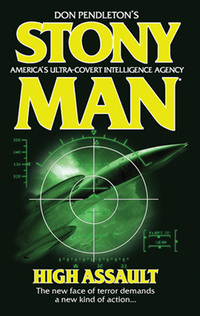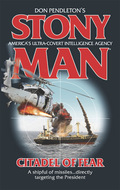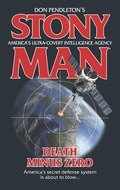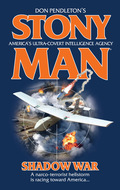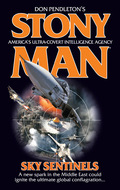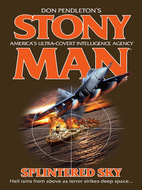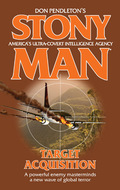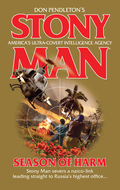Raamatut ei saa failina alla laadida, kuid seda saab lugeda meie rakenduses või veebis.
Loe raamatut: «High Assault»
“THIS IS A SURPRISE, NUNG,” BROGNOLA SAID
“I am here to do you a favor,” the man said.
“Really?” Brognola was not going to insult the man’s intelligence by claiming to be a minor functionary in the Justice Department.
“Your team did exceptionally well in Caracas.”
“I see,” Brognola said. It was surprising that Nung had so readily admitted to Chinese involvement.
“The world is a very complicated place, Mr. Brognola. It is my job to help guide my country through treacherous political waters. I understand well that you and I share similar vocations which often put us on different sides of the same issue.”
“But not in this case?”
“My superiors do not believe that a second attack of the magnitude of 9/11 would be advantageous to our relationship. A shift toward more conservative political thought by your nation could only serve to strain our national interactions.”
Brognola felt a cold chill surge through his body. “You have knowledge of a planned attack on the American homeland?”
High Assault
Don Pendleton’s
Stony Man®
America’s Ultra-Covert Intelligence Agency
HIGH ASSAULT
CONTENTS
CHAPTER ONE
CHAPTER TWO
CHAPTER THREE
CHAPTER FOUR
CHAPTER FIVE
CHAPTER SIX
CHAPTER SEVEN
CHAPTER EIGHT
CHAPTER NINE
CHAPTER TEN
CHAPTER ELEVEN
CHAPTER TWELVE
CHAPTER THIRTEEN
CHAPTER FOURTEEN
CHAPTER FIFTEEN
CHAPTER SIXTEEN
CHAPTER SEVENTEEN
CHAPTER EIGHTEEN
CHAPTER NINETEEN
CHAPTER TWENTY
CHAPTER TWENTY-ONE
CHAPTER TWENTY-TWO
CHAPTER TWENTY-THREE
CHAPTER TWENTY-FOUR
CHAPTER TWENTY-FIVE
CHAPTER TWENTY-SIX
CHAPTER TWENTY-SEVEN
CHAPTER ONE
October 25, 2007—Beirut, Lebanon
The massive Lockheed L-100 cargo plane circled above the night-shrouded landscape with the relentless patience of a vulture, its four heavy Allison T56-A-15 turboprop engines droning steadily.
From within the civilian version of the C-130E Hercules, Brigadier General Abdul-Ali Najafi watched the operation unfolding below him with the detached scrutiny of the consummate puppet master. Inside the insulated interior cabin, he reclined in an expensive leather wingback chair purchased at Nigel’s of London. In front of him rose a stack of HD television monitors fed from glasses-mounted, POV digital cameras that routed their signal through a booster unit in the ground-operations vehicle.
The images flickering on the screen were chaotic and jumbled as the strike team conducted its mission preparations. Najafi glimpsed the barrels of folding-stock Kalashnikovs, the dashboard of the big black Suburban SUV the hit squad was operating from and the masked faces of the unit. Through the windshield Najafi could just make out the urban residential street along which the target passed each day from work to home.
Najafi leaned forward and hit a key on his laptop. He spoke into the microphone. “Adjust focus,” he ordered.
The gunner wearing the headset lifted a hand encased in a black Lycra driver’s glove from the pistol grip of his weapon, and the image on the screen shifted as he worked the attachment. The resolution on the display screen sharpened.
“Very good,” Najafi said and leaned back into his chair.
From behind him he heard the door to the Lockheed’s tactical operation center open. Najafi knew without checking that it was his executive officer, Colonel Ayub. Ayub had come up through the regular Iranian army, but through family connections on the Revolutionary Council he had managed to secure the coveted posting as Najafi’s assistant.
“Do you have it?” Najafi demanded.
“Yes,” Ayub answered.
Najafi held up his hand, gesturing toward a clear spot on the table in front of him. His nails were manicured, and a gold Rolex Diplomat luxury watch was fitted onto a slender wrist. There was a heavy band of white gold on his ring finger, along with a silver-and-platinum signet ring on his index finger.
“Put it there,” he ordered.
Ayub stepped forward away from the TOC’s central door and around the dentist’s chair secured incongruously in the middle of the control room. He lifted a Schlesinger leather attaché case and set it down. The valise cost a thousand dollars, which Colonel Ayub knew because he had purchased both the case and the item it held on a recent shopping excursion in Tbilisi, Georgia, while doing business with certain Russian bankers in that city.
Beneath his dusky complexion Ayub paled as he looked at the screens. His eyes slid from the monitors to the wingback chair then back to the attaché case before coming to rest on the HD monitors again. His tongue flickered out to moisten his lips under a thin mustache. He released the handle of the case and stepped back.
On the screen there was a sudden flurry of motion. The team leader’s arm came up and pointed across his body out the passenger window. The man barked a command into his microphone that was clearly audible through the TOC’s sound system. Like dominoes falling in succession, the pictures on the screens of the monitor array flickered to life as one by one the other team members initiated their cameras.
“Now we’re moving,” Najafi murmured.
The commander drew a slim white cylinder of a fashionable Turkish cigarette from an open pack in his shirt pocket. Ayub responded without thinking, removing the lighter and stepping forward to light the cigarette as Najafi inclined his head.
Gray smoke billowed up in front of the screens. On the monitors, balaclava hoods were pulled into place, turning the hard-eyed killers into anonymous androids. The interior of the vehicle seemed filled with the muzzles of weapons.
Colonel Ayub let his breath out in a slow, controlled hiss and prayed Najafi couldn’t hear.
MICHAEL SULEIMAN looked out at the passing street through the bulletproof glass of his limousine’s rear windows. He watched, lost in thought, as the tall buildings of Beirut’s business district gave way to more residential neighborhoods as they drove up toward the hills east of the city.
In the car beside him, his wife, Suha, read from a children’s book to his four-year-old daughter, Taraneh. The little girl had her mother’s dark brown eyes and smooth olive complexion, as well as her keen intelligence. Michael Suleiman was always amazed by Suha’s insights, even after fifteen years of marriage. In his private moments he doubted seriously if he could have risen to power so smoothly in the Kataeb Party without her support.
His eyes slid past the scars of war left over from the violence of civil unrest dating as far back as the 1980s, despite the reconstruction efforts of more recent years. What his eyes couldn’t ignore were the piles of rubble left over from the sectarian violence following the 2006 incursion by the Israeli Defense Forces.
Unconsciously, Suleiman frowned at the thought. Despite international pledges to the contrary, that cross-border assault had only strengthened the hand of Iran in Lebanon, through their proxy puppets—Hezbollah.
In parliament, Suleiman had been using all the leverage he could muster to fight that Iranian influence in his homeland. It was this bitter opposition that had, in no small part, resulted in his newfound need for armed bodyguards.
Four soldiers armed with M-4 carbines drove a scout vehicle ahead of his limo, and even now one of the American-trained protection specialists rode with him, sitting next to his seven-year-old son, Ephraim, listening patiently as the young boy explained the intricacies of whatever new game he was playing on his handheld game system.
The bodyguard smiled indulgently over the boy’s head as his eyes met Suleiman’s. He looked like a favorite uncle indulging his nephew. Suleiman saw how earnest the boy, a spitting image of himself, was in the explanation and felt an answering grin tugging at his lips. Then the bodyguard’s jacket shifted, exposing the handle of the man’s machine pistol, and Suleiman’s smile faded. He looked away and out through the black-tinted glass of his window and sighed. One day, God willing, his country would be free of the influence of Iran. It was a mission to which he had dedicated himself tirelessly.
He’d be happier once they were safely home.
NAJAFI LEANED FORWARD, drawing deeply on his cigarette, his eyes narrowing as he watched the screen. The white Ford Excursion carrying Suleiman’s bodyguards drove past the mouth of his team’s ambush street, followed seconds later by the black stretch limo.
The team leader slapped the dashboard, and the SUV gunned forward as the vehicle operator responded to the command. The big automobile shot out of the side street and pulled in behind the cruising limo. The death squad began babbling excitedly, the words coming too hard and fast to differentiate over the microphone pickups. From behind the squad leader came the unmistakable staccato rhythm of a Kalashnikov on fully automatic.
Inside the confined space of the TOC, Ayub could feel his commander’s excitement. It rose from the man like heat or static electricity. The head of Iran’s elite Special Republican Guard loved the visceral thrill of his work.
On the screen Najafi watched as, ahead of the limousine, Suleiman’s scout vehicle swerved into the opposite lane in response to the first burst of gunfire. The interception had been designed to take place on the tight switchbacks leading into the residential hills above Beirut—making it easier to box in the target vehicles. The protective agents were falling neatly into Najafi’s trap.
The modified sunroof of the lead SUV slid back and a gunner armed with an American M-4 carbine popped out of the opening. The SUV slowed as the stretch limo sped up, making it easier for them to try to change places.
“Now!” Najafi snarled into his microphone pickup.
Suleiman’s bodyguard shouldered up his carbine and triggered a tight burst. On the HD monitor Najafi and Ayub watched the rounds spark off the reinforced glass of the hit squad’s vehicle. Ahead on the road a tight switchback suddenly appeared. The bodyguard SUV’s brake lights flashed red and the limo driver gunned it even harder.
“Yes,” Najafi whispered as if breathing into the ear of a lover.
On the screen, the multi-POV camera angles simultaneously revealed the sudden appearance of the garbage truck on the narrow road. The tail ends of both target vehicles suddenly fishtailed as their drivers slammed on their brakes. The garbage truck slowed considerably and swerved to the right, nose pointed toward the downhill side of the road.
The bodyguard SUV slammed into the back half of the garbage truck, its front end collapsing with a shriek of metal clearly audible over the repeated bursts of the gunfire pouring from the Hezbollah vehicle. The bodyguard firing from the sunroof was jerked forward like a rag doll, his weapon spinning away like a pinwheel as he was flung into the unforgiving steel of the massive garbage truck. His body seemed to explode with spraying blood as he was smashed to a pulp.
The front end of the limo slid forward at the end of a desperate skid and rammed into the garbage truck’s immense bumper. The limo’s hood crumpled, and the big V-12 engine block was shoved backward into the front passenger compartment, splitting the reinforced glass of the windshield. The spilled engine fluids caught fire and began to burn.
On the HD screen the garbage truck’s passenger door was kicked open. The assassin’s folding stock AKMS poured a hailstorm of heavy lead down on the crumpled limo, the muzzle-flash spitting star-pattern bursts of flame as the weapon bucked and kicked in the Hezbollah gunner’s hands.
The rounds slammed into the SUV’s already compromised windshield at point-blank range, punching divots and gouges and spiderwebbing the safety glass until it began to come apart completely. The black Suburban SUV holding the Hezbollah hit squad drove straight up into the pile, smashing bumpers with Suleiman’s limo and pinning it into place inside the killbox.
The Hezbollah hitters bailed out of their vehicles, spraying 7.62 mm rounds at the bodyguard vehicle. From that range, and under the terrific onslaught, glass was pulverized and metal riddled. On the TOC screens Ayub could clearly see the dark silhouettes of the trapped bodyguards dance and jerk.
On the screen, the team leader peeled off from the main group. A second and then a third Hezbollah foot soldier followed closely as they headed for the trapped and burning limo in a classic fire team configuration. The stretch limo’s driver door flew open and a Lebanese army commando in a dark suit and armed with an MP-5K emerged.
He was met with a merciless wall of lead as the team leader and flank gunners unleashed their Kalashnikovs. The HD monitors in the Lockheed’s TOC showed the carnage in startling clarity. Najafi ground out one cigarette as he watched the bodyguard come apart, dropping hard to his knees, his jaw going slack as the big bullets knifed through his body armor to scramble his organs. Then his head disappeared in a spray of pink and scarlet, and the brigadier general pulled another cigarette from his pack.
With the reactions of a trained sycophant, Ayub was there to light it. There were dark stains on his silk shirt under his armpits and his forehead was beaded with sweat. Najafi’s eyes danced from one monitor screen to the other, not wanting to miss one second of the grotesque action.
On the screen, the Hezbollah team leader gestured with the muzzle of his AKMS, and one of his fire team ran forward to cover the open limo door, his boots splashing through the dead bodyguard’s blood like a child stomping in a puddle. The leader spun and his hand appeared in his POV shot, pointing at the rear door, then making a slashing motion.
“Now we’re on it,” Najafi said, his voice almost a giggle. “Let this Lebanese Christian learn what it means to displease the servants of the Revolutionary Council.”
Ayub muttered something appropriate as he watched, mesmerized, as the Hezbollah team’s explosives engineer sprang into action. The man let his AKMS hang from its cross-body sling as he pulled an industrial appliance from a thigh pouch on his web gear. The device looked almost identical to a home construction caulking gun.
The Hezbollah gunner ran forward, the caulking gun up in his gloved fists under the cover of the team leader and secondary gunner. Behind them the remaining hitters had pushed right up onto the wreckage of the bodyguard SUV and were spraying the vehicle’s interior with excessive enthusiasm. Two of the gunners peeled off and came over to take up overwatch positions as the explosives trooper prepped the egress point.
The gunman, a powerfully built fireplug of a man, raced up to the rear passenger door of the limo and brought up his applicator. He squeezed the lever against the pistol-grip handle and instantly a Semtex-based foam shot out of the slit-tipped nozzle and stuck to the vehicle in inch-thick strips.
With smooth, practiced motions he outlined the plastique foam around the edges of the door where they met the vehicle frame. Once he had outlined the structure he pulled a thin timing pencil from his black fatigue shirt and hit the plunger on the top to start the five-second countdown.
He inserted the initiator charge in the explosives molding and sprang back, turning his head to the side as the rest of the team fanned out to give the breaching charge room to detonate.
In the C-130, Najafi gripped the edge of the table hard enough to turn his knuckles white. The bright cherry on the end of his cigarette flared like an airstrip beacon as he drew on it, and his eyes fairly bulged from their sockets as he soaked in every aspect of the pregnant seconds before the charge went off.
The crack of the explosive detonating was sharp enough to hurt Ayub’s ears through the speaker pickups. The blinding flash of light was followed immediately by a billowing cloud of gray-white smoke. The car door shot straight off the frame and sailed outward ten feet like a cork from a champagne bottle.
The bodyguard inside the rear compartment of the limo came out immediately, his MP-5K up in both hands and blazing. The 9 mm rounds tore the face off the secondary gunner and spread his brains and skull across his team leader. Blood and clumps of flesh struck the POV camera and smeared the lens, obscuring the leader’s feed.
The bodyguard landed on the road and went to one knee, swinging the compact subgun around. From half a dozen directions AKMS assault rifles opened up in a brutal symphony. The bodyguard came apart like a grenade exploding and his submachine was shattered as his hands were torn from his wrists.
“Wipe your camera! Wipe your camera!” Najafi screamed at the leader.
Ayub didn’t know why Najafi was so excited as the feed from six other cameras showed the scene well enough. On the leader’s screen the Hezbollah assassin followed the frantic order of the brigadier general and wiped his screen clear. Smoke was billowing around them as the hit squad collapsed on the breach point into the target vehicle.
Ayub’s eyes flickered to the tactical display clock on the wall next to the bank of television screens. Fifty-eight seconds had passed since the initiation of the ambush. The Hezbollah attackers were performing ahead of schedule.
What happened next was ugly.
The big, rough men came out of the car with Michael Suleiman between them. He tried to struggle and they pounded him brutally with fists until he was battered and dazed. The team leader struck him once in the face with the smoking muzzle of his AKMS, tearing the Lebanese politician’s nose as the kidnappers dropped him to the ground. One of the men came down with a knee on Suleiman’s back, causing the parliamentary leader to scream out in pain.
As a plastic zip tie was tightened around Suleiman’s wrists, the man’s seven-year-old son came charging out of the ruined vehicle to protect his father. Ephraim Suleiman’s young face was twisted in anger, and tears formed tracks down his cheeks as he sprang on the closest Hezbollah killer.
The Iranian-trained terrorist backhanded the boy and the child went tumbling backward. The explosives trooper stepped into the foreground and brought up his AKMS.
CHAPTER TWO
Suleiman screamed in protest, but his cry was cut off by the banging clatter of the Kalashnikov on full auto. The boy’s body came apart in chunks of flesh and gouts of blood and most of him ended up spread across the rear bumper and trunk of the limo.
There was a scream so shrill and frantic it cut through the roar of the weapons, and the Hezbollah team leader’s camera snapped back toward the breach point on the limo. Suha Suleiman, looking disheveled and battered, clawed her way out of the swirling smoke inside the limo passenger compartment. Behind her the shell-shocked face of her daughter, Taraneh, stared out blankly.
Suha screeched again as she saw the pitiful pile that was all that remained of her son. She opened her mouth and her beautiful face twisted into a mask of hurt and confusion in marked contrast to the tiny mirror image at her side, who simply stared at the trussed-up image of her father on the road.
“Finish it,” Najafi said into the microphone, and this time his voice was a giggle.
No one on the team hesitated. The terrorists turned their weapons on the wife and daughter of a known Israeli sympathizer. They fired. Michael Suleiman screamed. Green tracer rounds knifed through the roiling smoke. Colonel Ayub felt his heart lurch so painfully in his chest he thought he’d torn it. The woman and girl were punched backward into the vehicle. Suleiman screamed again, but it was only the beginning of the screaming he would do this day.
Brigadier General Najafi moved his finger over and hit the button on the intercom system for the plane, putting him instantly in touch with the pilots of the C-130.
“The package is acquired,” he said. “Put the plane down.”
“Yes, sir,” the pilot answered.
Behind Najafi, Colonel Ayub found his eyes once again drawn to the expensive attaché sitting on the table next to his commander. He thought about what it held. He closed his eyes.
The plane made its descending approach.
THE BIG CARGO PLANE landed on an improved runway controlled by a pro-Iranian Shiite militia. The pilot deftly leveled out and brought the massive bird down on the mile-long runway. As soon as the wheels hit the tarmac the load master in the cavernous bay initiated the cargo-acquisition procedures and the ramp began to lower even as the plane continued to taxi down the runway.
The Hezbollah hit team’s Toyota Sequoia raced out from between two hangars and onto the runway. The ramp lowered into position just a few short inches above the pavement and the SUV, with Michael Suleiman trussed up inside, ran up on the platform.
The vehicle driver gunned the Sequoia up onto the platform and drove it straight into the cargo bay of the lumbering C-130, which was large enough to hold five more just like it. Once the SUV was inside, the load master alerted the pilot and began closing the ramp. Instantly the cargo plane’s mammoth Allison Turbine engines changed pitch and began racing.
Instead of holding down the speed the pilot applied full throttle, and almost immediately the blunt nose of the airplane began to lift. Inside the cargo hold the snatch team waited for takeoff and watched the load master, now in a jump chair, for the all clear to exit their vehicles.
Inside the TOC both Najafi and Ayub surveyed the hold through a video feed, Najafi calmly smoking while his subordinate stood mute and sweating.
Engines screaming, the C-130 completed its stump-and-jump running landing and left Lebanese soil, heading out to the west toward the sparkling blue waters of the Mediterranean Ocean.
As the plane began a smooth ascent, the load master nodded to the Hezbollah agents in the Sequoia. They sprang into action as Najafi came out and stood on the scaffolding leading up to the TOC’s door. Ayub remained in the chamber, studiously avoiding looking at either the attaché case or the dentist chair. It took a considerable amount of willpower.
Outside the door he heard Najafi taunt the prisoner.
“Ah, Michael, so good to see you again,” Najafi said. He looked imperiously down from his perch at the top of the scaffolding. In his mind he was Xerxes surveying the beating of an insolent slave at the hands of his Immortals. The Hezbollah thugs jerked the Lebanese parliamentary member from the back of the SUV. His face was purple and black and swollen. Bloody drool hung in ropes from split lips, and he looked up at Najafi with the dull eyes of a wounded animal.
He tried to speak as he was carried up the steps by the masked gunmen but could only manage to gag. His hands and feet had been secured behind him with white plastic zip ties and his business suit had been torn and splattered with blood. He could only manage mewling sounds as he was shoved through the TOC’s door and thrown roughly into the dentist’s chair.
While the Hezbollah gunners cut the man loose from his restraints and then locked him into the chair, Najafi fitted his impeccable suit jacket on a hanger, then hung that from a hook on the wall. He maintained a calm, playful manner as he donned a blue apron and a pair of black rubber gloves.
“I know we’ve had our difference, Michael,” he purred. “That whole public denouncement of my diplomatic mission as nothing more than a political destabilization operation by Ansar-al-Mahdi was, in particular, quite hurtful—conveyed as it was on your parliamentary floor, in front of television cameras.”
Behind the men, Colonel Ayub took an unconscious step backward as Najafi donned a cotton surgical mask and a pair of clear plastic safety glasses. He came up hard against the cold metal wall of the TOC. He could feel the vibration of the plane through the wall as it climbed toward a thirty-thousand-foot ceiling. The Hezbollah agents were inscrutable observers behind their masks, their weapons still reeking of cordite from their recent use.
“Despite that…unpleasantness,” Najafi continued, “I was so sorry to hear about the loss of your family, Michael. These are unfortunate times. The Koran tells us to turn to Allah and the words of the Prophet in times of trouble.” Najafi stopped, regarded the battered Lebanese secured to the chair in front of him. “But you don’t follow the teachings of the Koran, do you, Michael? You worship this Jesus Christ, like some American lapdog.”
“You murdered my family!” Suleiman screamed. “Killer! You disgusting animal!”
The bruised man pushed up against his restraints, disfigured face twisted into rage. His eyes, almost swollen shut, blazed with hate and anger until they were bright points of light. Bloody spittle flew from split lips over broken teeth, and the veins of his neck stood out in sharp relief, like rivers.
Najafi ignored the outburst. He calmly walked over to his attaché case where it sat on the table and undid the gold relief clasps. The springs were tight and the snap of their release was clearly audible despite Michael Suleiman’s inarticulate screaming. Suleiman’s snarls turned to choking gags behind Najafi and, up against the wall, Colonel Ayub closed his eyes.
Najafi reached into his expensive leather attaché case. The Bosch eighteen-volt high-torque impact wrench was a cordless power drill. Michael Suleiman fell silent as Najafi turned around with the 9.5-inch device in his hands. The power tool was blue with the trigger and brand name printed in a brilliant red. The flat battery pack was secured to the bottom of the drill’s pistol grip like a magazine in a handgun. The drill bit was itself five inches long, grooved like a rifle barrel and colored a dull graphite-gray that seemed to absorb light.
Grinning, Najafi depressed the trigger. The 2.4 Ah batteries surged power at 1,900 RPM, generating 350 foot pounds of torque as specially designed cooling rods absorbed the heat generated by use.
“What could you possibly want from me?” Suleiman begged. “What could I possibly know?”
Najafi released the trigger and watched the drill spin down. His sneer was spread across his face as he called over his shoulder to the visibly pale Ayub. “Why do they always think it’s about information?”
Chuckling to himself, Najafi turned back toward the helpless Suleiman. “Michael, I already know everything I need to know. There are no secrets in Beirut I do not already possess.”
Najafi stepped forward and touched the hard metal of the drill against Suleiman’s left leg. The power tool rested on his vastus medialis, the teardrop-shaped muscle of the quadriceps located next to the kneecap. His gloved finger rested lightly on the red trigger of the cordless drill.
“Then why?” Suleiman asked, his voice a moan. “Just kill me. You murdered my family. I’ve suffered enough.”
“I say when you’ve suffered enough!” Najafi suddenly screamed. His face was a grossly animated mask of anger.
The drill screamed as the leader of Ansar-al-Mahdi pulled the trigger and pushed downward. The powerful industrial drill bit easily into Michael Suleiman’s flesh, burning through skin and tearing into muscle fiber as if they were paper. Scarlet blood splashed as the prisoner screamed, streaking Najafi’s pale blue apron and marking his safety glasses with beads of crimson.
Najafi wore a maniacal grin as he pulled the drill free then plunged it down into Suleiman’s leg again four more times in rapid succession. Colonel Ayub felt his gorge rising as he tried to look away, but the tortured man’s screams drew his eyes despite himself. Blood spilled into the seat of the dentist’s chair and puddled on the floor of the TOC.
Suddenly a satellite phone positioned on the table below the POV cam monitors came to life. Najafi straightened, lips pursed as he let the spinning drill power down. Michael Suleiman’s head sagged on his neck.
“Always with the interruptions,” Najafi snarled. “Always whenever I’m really starting to make progress on a project I am interrupted.”
The phone beeped loudly again.
Najafi sighed, almost theatrically. He turned around and walked toward the table. He stopped, looking down at the heavy power tool he still held in his hands. He turned back toward the helpless and bleeding Suleiman.
“Would you hold this for me?” he asked. “Thank you.”
The drill screamed into life and Najafi carelessly pushed the impact wrench down into the Lebanese political leader’s thigh until it bit into the bone of his femur. The man screamed as it cored into his bone marrow.
The phone rang and without bothering to remove his blood-drenched glove, Najafi snatched it up. “Yes, what is it?” he snapped.
Colonel Ayub, standing only a few short yards away, could hear clearly both sides of the conversation and he recognized the voice on the other end of the connection immediately. It was a voice he feared.
“Is that how you talk to a man in my position, General?” the voice asked.
Najafi’s manner and tone instantly changed. “Of course not, Your Eminence,” he said. “How may I serve you?”
Behind them Michael Suleiman moaned in agony, the noise very loud in the confined space of the mobile TOC. Najafi scowled fiercely and pointed a finger at the Hezbollah team leader. With a slash of his hand he indicated the bound and helpless Suleiman. Instantly the terrorist stepped forward and threw a right cross down onto the prisoner. The knuckles of the man’s hand connected with the sharp prominence of Michael Suleiman’s jaw, and the Lebanese political leader’s head went limp on his neck.
Tasuta katkend on lõppenud.

